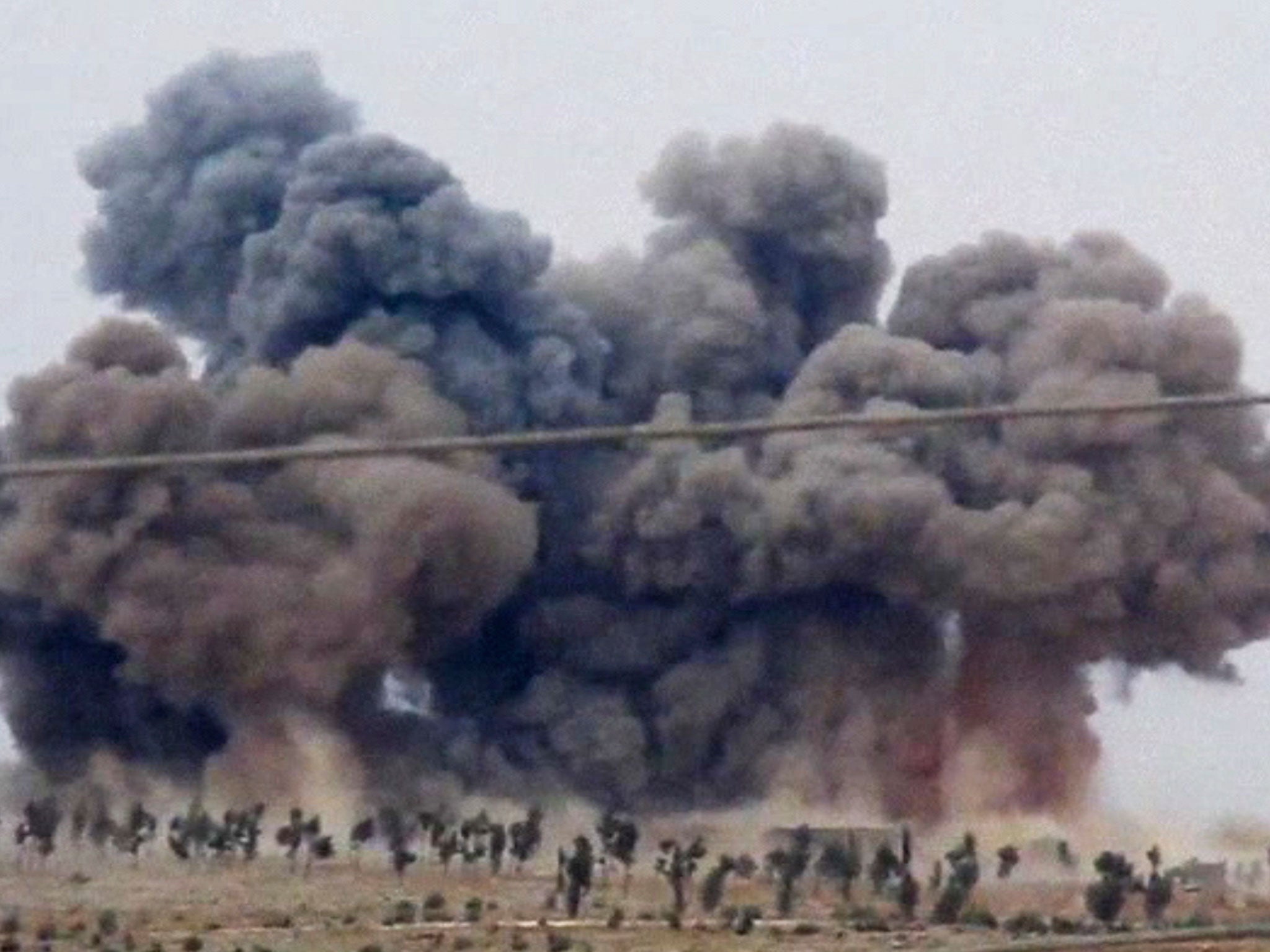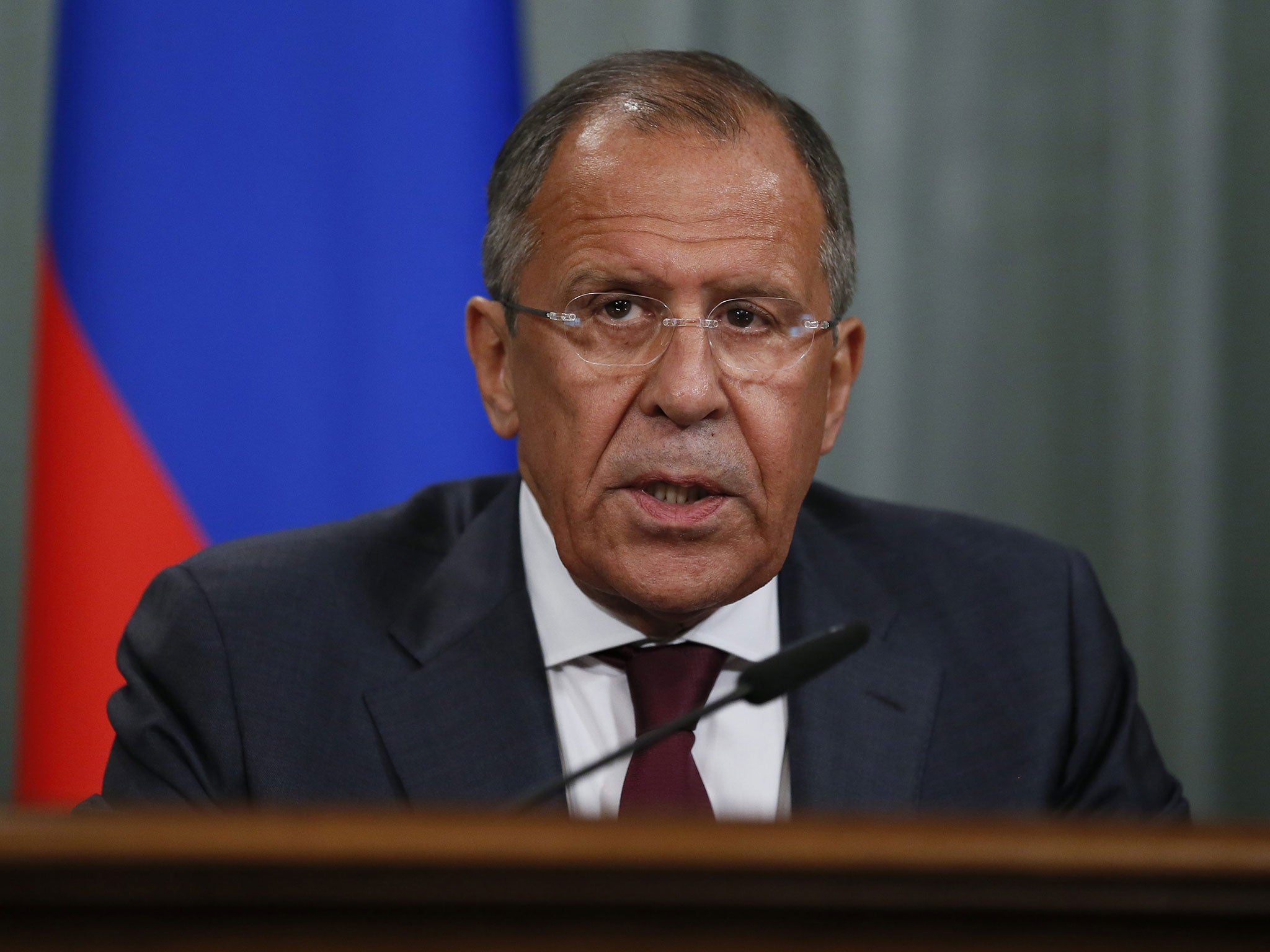Russia in Syria: CIA-backed 'moderate' rebels struck by fresh air strikes as Iranian troops 'pour into conflict'
Russian Foreign Minister insists Moscow sees 'eye-to-eye' with US-led coalition in wanting to combat Isis militants

Your support helps us to tell the story
From reproductive rights to climate change to Big Tech, The Independent is on the ground when the story is developing. Whether it's investigating the financials of Elon Musk's pro-Trump PAC or producing our latest documentary, 'The A Word', which shines a light on the American women fighting for reproductive rights, we know how important it is to parse out the facts from the messaging.
At such a critical moment in US history, we need reporters on the ground. Your donation allows us to keep sending journalists to speak to both sides of the story.
The Independent is trusted by Americans across the entire political spectrum. And unlike many other quality news outlets, we choose not to lock Americans out of our reporting and analysis with paywalls. We believe quality journalism should be available to everyone, paid for by those who can afford it.
Your support makes all the difference.A military inferno is in the making in Syria after Russia unleashed bombing raids on what it said were “terrorist” targets but which, on early evidence, seemed to have included at least one CIA-backed rebel group – and as reports surfaced of Iranian troops pouring into the conflict.
In comments at the United Nations in New York, the Russian Foreign Minister, Sergei Lavrov, sought to play down the notion of an out-and-out confrontation with the United States in Syria, insisting that Moscow saw “eye-to-eye” with the US-led coalition in wanting only to combat Isis militants. But he declined to say that those targeted might include groups explicitly backed by the US.
Mr Lavrov pushed back aggressively at the allegation made by US Defence Secretary Ashton Carter that Moscow was “pouring gasoline on a fire”, implying that American discomfort with Russia’s actions was hypocritical.
“We know about many fires gasolined by the Pentagon in the region, and we believe that our position is absolutely in line with international law.”
We believe our position is absolutely in line with international law
Sources in Lebanon told the Reuters news agency that hundreds of Iranian troops have entered Syria to bolster the beleaguered armed forces of President Bashar al-Assad. If confirmed, the combination of that support from Iran and Russia risks not just strengthening Mr Assad’s grip on power but the conflict itself.
US officials corroborated the presence of Iranian soldiers but could offer no numbers.
US Army Colonel Steve Warren told reporters: “We know the Iranians are a part of this. We’ve known that since day one.”
In a statement, a Kremlin spokesman attempted to clarify matters, saying Russia’s intervention was “really to help the armed forces of Syria in their weak spots” as it combats extremists like Isis.

Russian jets have primarily bombed across central and north-western Syria, areas of strategic importance to the Assad regime as it tries to protect its strongholds in Damascus and on the coast.
As if the military pyre in Syria were not already complicated and volatile enough, newly arriving Iranian troops, who reportedly began crossing into Syria 10 days ago, will probably also seek support from Mr Assad’s Lebanese Hezbollah allies and Shia militia fighters from Iraq. Thus, in just a few short days, a wide coalition including Iran and Russia has been forged to fight alongside Assad.
It is a situation so dangerous that it could force Washington and its allies, including Britain, to accept more publicly than they have so far that Mr Assad will remain at least part of the equation for some time as all sides seek to negotiate a political transition for the country. Although they will surely continue to insist, as they have done this week in New York, that in the end he must go and cannot stand for election again.
Mr Lavrov said Russia’s only goal is to ensure the destruction of Isis – a mission that the US-led coalition, he noted, has thus far failed to do – the al-Nusra front and “other groups”.
He added: “If it acts like a terrorist, if it walks like a terrorist and if it fights like a terrorist, it is a terrorist. Yes?” He made one distinction: Russia does not consider the Free Syrian Army to be terror group, he said.
But the leader of the CIA-backed Liwa Suqour al-Jabal rebel group, Hassan Haj Ali, told Reuters that Russian jets had rained around 20 missiles in two different sorties on its base in Idlib province. His fighters have received training from the CIA as part of the its largely discredited attempts to arm and encourage so-called moderate rebel groups opposed to Mr Assad.
Mr Lavrov also made no bones, however, about Moscow coordinating its attacks with the Assad forces, saying it is “recognised everywhere that air strikes alone would not resolve the problem” of Isis. He argued that Russia alone was acting legally because its actions were invited by the regime. He said Moscow had no plans to extend it anti-Isis strikes into Iraq, which had not invited Russia in.
However, the Iraqi Prime Minister, whose government recently signed an intelligence sharing treaty with Russia, Syria and Iran, has said that he would welcome Russian strikes against Isis within his country.
The week’s developments is growing into a full-blown political crisis for President Barack Obama, who until just a few weeks ago was focused solely on securing the nuclear deal with Iran, largely at the expense of handling the growing Syria crisis.
Republicans on Capitol Hill will not be persuaded by Moscow’s contention that it and the US-led coalition are on the same side.
“Their initial strikes were against the individuals and the groups that have been funded and trained by our CIA, in a credible flaunting of any kind of cooperation or effort to conceal what Putin’s priority is – and that is, of course, to prop up Bashar Assad,” Senator John McCain declared.
An urgent first priority of all involved was the so-called “deconflict” talks that began between leaders of the Russia and US military, to guard against accidental clashes between their pilots over Syrian skies.
Those talks were being held by video-conference between their capitals, officials said. They would start “very, very soon,” Mr Lavrov insisted.
Mr Lavrov ducked a question about the apparent arrival of Iranian troops in the arena but notably skipped the opportunity to deny that they were there.
The French air force also began operations in Syria this week.
Join our commenting forum
Join thought-provoking conversations, follow other Independent readers and see their replies
Comments